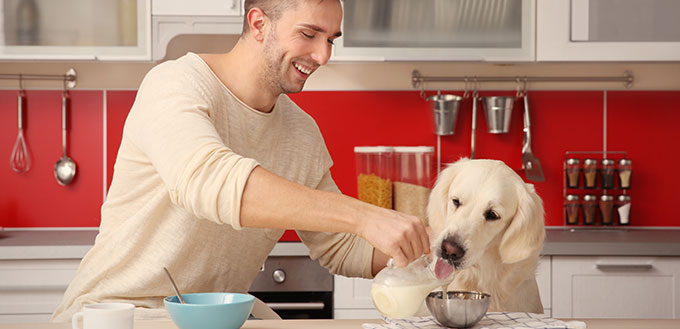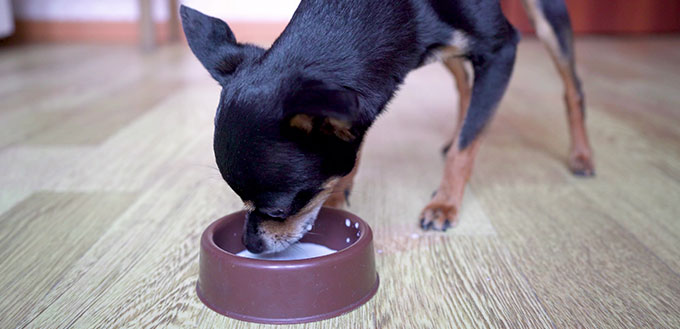Drinking milk can provide humans with a range of nutrients such as calcium, vitamins A, D, and B12 to help support teeth and bones, and prevent osteoporosis. So, you may be wondering, can something so beneficial to human health support my dog? Can dogs drink milk? Specifically: Can dogs drink cows’ milk? In short, small doses of milk can be consumed, however, you may want to consider the long-term effects that can occur if your dog drinks milk regularly.

Note: The contents of the www.mypetneedsthat.com website, such as text, graphics, images, and other material contained on this site (“Content”) are for informational purposes only.
The Content is not intended to be a substitute for professional veterinarian advice, diagnosis, or treatment.
Always seek the advice of your veterinarian with any questions you may have regarding the medical condition of your pet.
Never disregard professional advice or delay in seeking it because of something you have read on this website.
Is Milk Good for Dogs?
As a dog owner, it’s understandable to want to switch up what treats and/or dog food to give your companion so a bit of cow’s milk out of the refrigerator won’t hurt, right? As mentioned above, small quantities of milk aren’t harmful. However, it’s useful for you to understand that your dog will not have the same food tolerance as they once did when they were a puppy. As such, it is entirely possible that the more you give your dog milk, the more likely your dog is to become lactose intolerant.
After all, milk is high in fat and sugars and won’t provide add any real nutritional value to your dogs’ diet. Not only can a lot of milk result in digestive issues, but drinking milk excessively can cause pancreatitis and obesity.
Can Puppies Drink Milk?
From birth, your puppy will rely solely on its mother’s milk, as that will provide all the nutrients it will need to grow. Milk contains a sugar called lactose, which will be broken down by an enzyme called lactase to prevent digestive problems. Puppies generally have plenty of lactase in their earlier years however, as they are weaned from their mother’s milk they begin to produce less and less of the lactase enzyme which could potentially result in lactose intolerance.
If you have a puppy that cannot currently feed on its mother, rather than allow the puppy to drink pure cow’s milk or goat’s milk, you can purchase milk replacers containing all of the vital nutrients and good bacteria to ensure your dog grows up healthy and strong. As a note, some of the items listed do contain goat’s milk as it does have some positive benefits for your dog but they also contain many more nutritious ingredients to assist your dog’s health.
Are Dogs Lactose Intolerant?
Not all dogs are lactose intolerant however, many dogs can develop it after excessive milk ingestion or consumption of dairy products. Below, we have broken down some vital information that may help you in maximizing your dog’s diet.
Lactose Intolerance in Dogs
Milk drinking is a vital part of most young mammals’ development but it is not vital for them to continue consuming milk in later years. It is not impossible for your dog to digest dairy products but be aware that it gets more and more difficult for them to tolerate lactose as an adult.
Symptoms of Lactose Intolerance in Dogs
It is not certain that all adult dogs will develop an intolerance but it’s important to know what to look for and why giving milk to your dog can be harmful. It may take a while for symptoms to become apparent but when your dog drinks milk lookout the following signs:
Allowing your dog to drink cow’s milk in abundance could result in GI upset and will ultimately affect the digestive system negatively. Lactose intolerant dogs may show symptoms resembling those of other food allergies so keeping an eye on what new foods your dog’s wolfing down could prevent you from having to seek veterinary care later on down the line.
Much the same as cow’s milk, some dairy products may also result in digestive-related health issues, this is primarily because there is too much fat and sugar in these for your dog’s stomach to be able to digest.
Milk and Dairy Products for Your Dog
If you’re certain that your dog has no food allergy it’s safe for them to eat dairy products such as cheese or plain yogurt and even a few tablespoons of cow’s milk. The best milk for dogs is goat’s milk as this is also high in probiotics and is safe to drink.
In fact, plain yogurts, and cheeses also contain probiotics that can help your dog’s gut. However, just be sure to look out for the signs listed above as, like humans, dogs can develop allergic reactions and GI upset.
Varying Degrees of Ingredients in Milk Products
In addition to this, it’s useful to know that an individual dairy product will contain a differing gram of lactose in comparison to other dairy foods. As explained in a simple table provided by Dog Food Advisor, whole milk contains 11 grams, whereas cheddar cheese contains zero grams. Cheese is generally a more suitable dairy item for your dog as it is very low in lactose.
Yak’s Milk Dog Treats
It is possible for dog owners to get their hands on lactose-free treats made from yak’s milk that will not only be easy for your dog to digest but will also be kind to teeth as they become softer as it is chewed upon. Even if your dog is not allergic to dairy it will still struggle to digest lactose due to the lack of lactase and could still suffer from stomach upset so we thought we’d throw in this type of dog treat just in case you were looking for specific ideas for treats!
Plant-Based Milk Alternatives
A lot of people tend to replace milk with variations such as soy milk, coconut milk, or almond milk when cutting out dairy. So, considering that these are free from dairy, you may be wondering: if dogs can’t drink milk, can dogs drink plant-based substitutes instead?
The answer remains similar to that of the original question of ‘can dogs drink milk?’ They can in moderation however, we, along with the American kennel club, will recommend that you look out for ingredients that can have long-term effects on your dog. Xylitol is a particular ingredient to watch out for as it is an artificial sweetener that is toxic to dogs.

In Conclusion – Can Dogs Have Milk?
Is milk bad for dogs? It can be but only if you’re too generous! The main thing is that your dogs drink water in order to stay hydrated!
So, can you give dogs milk? Yes. However, milk and dairy products do not provide all of the essential nutrients unlike your usual dog’s food, and therefore it does not need to be included in their regular diet. We can all be guilty of feeding our dogs human foods but the best way to keep them happy and healthy is to make efforts to avoid your dog from developing food intolerance.







